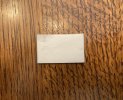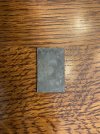Bühlmann
North Lake Forge
- Joined
- Jan 6, 2022
- Messages
- 475
What’s the best way to darken 15n20? I know it’s meant to stay bright with its Ni content in pattern welded applications, but if used as a mono-steel blade is it possible for the flats be effectively darkened to contrast the bevels? I tried some cold blue and it came out pretty blotchy & irregular. Is this just the nature of the material, or is there a better way?


